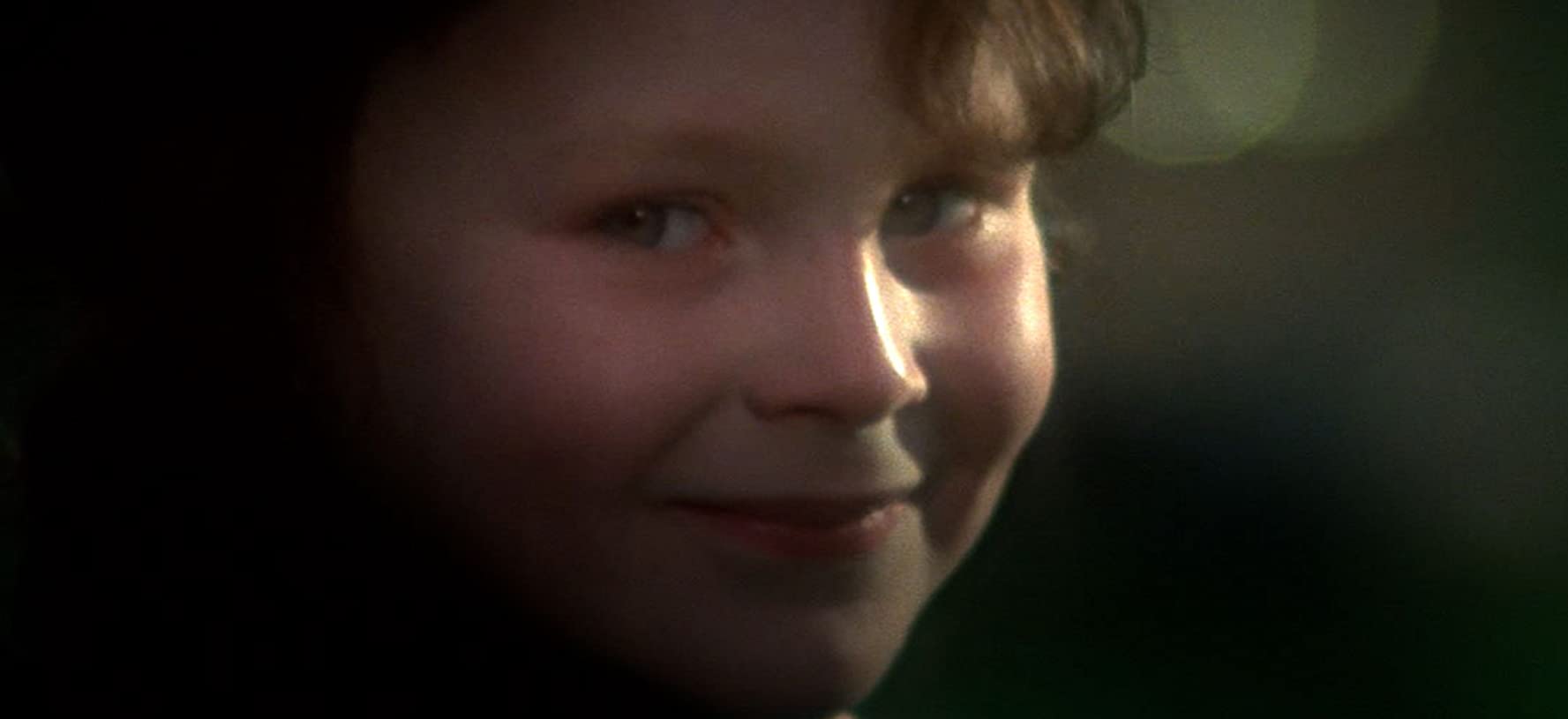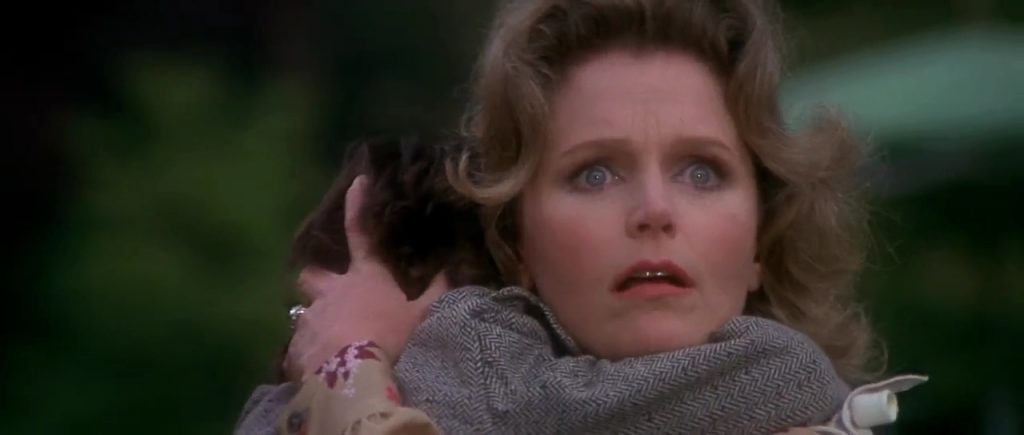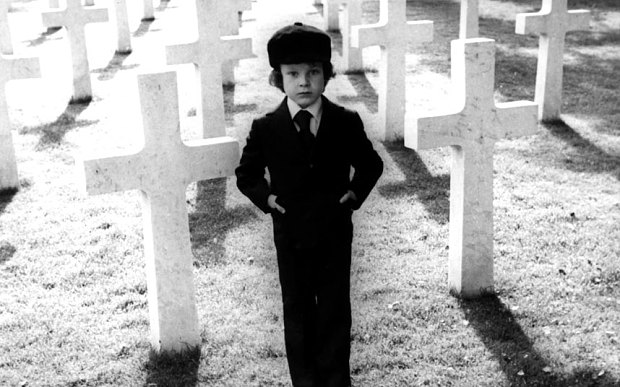
Why ‘The Omen’ Hasn’t Lost its Tragic Magic
Richard Donner’s The Omen doesn’t make parenting look easy. In fact, it makes it look like a living hell.
Richard Donner’s The Omen doesn’t make parenting look easy. In fact, it makes it look like a living hell. First, imagine you, Robert Thorn (Gregory Peck) stand to possibly become US Ambassador to the UK (and if you have rich parents, this might come easier to you). Things seem to be going well, right? You even get your wife Katherine (the beautiful Lee Remick) pregnant — which you likely didn’t mind doing, especially when you aspire to be a loving father. However, about nine months later, things start going wrong.
Imagine Katherine loses the child at birth, then the hospital chaplain secretly offers you another child, so your wife doesn’t have to know. If you accept such an offer, how would you feel about it? Well, chances are you’d have mixed feellings already. However, let’s say that, over time, you get strange feelings about this replacement kid, who you have named Damien (Harvey Spencer Stephens). Curiously, he never gets sick or seems to have headaches. Then, your hired nanny (Holly Palance) then makes a rash decision at your son’s birthday party (to put it nicely), permanently weirding you out about birthday cakes.

It doesn’t stop there, however. You’re being pestered by some warped old Priest (Patrick Troughton). Damien freaks out about attending a wedding ceremony at a church, fighting his mother violently before he can be brought onto the steps of the cathedral. Your wife also finds out that zoo animals are terrified of your boy, with giraffes fleeing and baboons threatening to attack her car in the safari park.
What the hell is going on? Also, what does that weird photographer guy (David Warner) want? Between him, that Priest, your wife’s depression, and this new nanny (Billie Whitelaw) who’s too obsessed with her dog, you must emphatically ask again: What the hell is going on?!
Wait For It…
Hell is exactly what is going on! It seems your wife is right to regard Damien like an alien presence. He’s not just a bad boy, a slacker, or a struggling musician. As “The Omen” presses on, much of the subtlety disappears, and the happy family seems lost for all time. The mood of this film also lends weight to it. For example, its haunting score, provided by the brilliant Jerry Goldsmith. As the choral voices chant in a sinister fashion, you really don’t need the words translated into English to sense the foreboding of evil (Goldsmith won his only Oscar for this score, by the way).
This movie has been identified for quite some time as a horror classic, and it conveys a lot of traditional horror moods. Nevertheless, “The Omen” doesn’t provide some masked, hulking villain at a campsite or a beast who comes out only under a full moon. Sure, this film has some far-fetched elements, but its somber tones and incrementally evil atmosphere are hard to match.
In fact, it’s so hard to duplicate that, if you really think about it, The Omen hasn’t really been touched much by parodies. It’s like even dumb-ass horror-comedy goofballs are like, “Nah, we should just leave that classic film alone.” It doesn’t help that the film’s production was considered to be cursed.
Overlooked Political Details of The Omen?
Okay, okay, I might be building this movie up too much for first-time viewers. But why the uproar? Well, with The Omen, there’s a little more than meets the eye. There are little subplots you might find, if you’re careful enough to look. For example, this movie actually does delve into politics, ever-so-slightly. Or is it all subtle? Actually, The Omen strongly suggests that evil arises from the world of politics. In fact, Peck’s character is right alongside it, and he actually seems like a relatively good, normal guy. It’s even suggested that the evil nature of his position is practically inevitable. It will lead to turmoil.
Granted, Damien exists as sort of a symbolic element, but this hardly even qualifies as a “crazy fan theory” regarding the first film. There are other hints of underlying political strain. Robert and Katherine are generally on the serious side, and they often end up in some needlessly tense conversations. While this could be a commentary on the characters themselves, and their unique situation, it no doubt also comments on the high-stress nature of his position. Though it initially seems they’ll have it easy, it seems the two are never quite happy. Reality keeps raining on their parade, and Damien’s hidden nature also represents the dark secrets people keep.
Also, let’s be real: Katherine seems like the type who ends up shouting at her servants, especially when her husband is away. She might not be a villain, but she seems to have disdain for people below her “station” in life. This aspect of the story isn’t exactly prominent, but you can see how she regards the nanny during that one key scene. It doesn’t seem like a coincidence that such an exchange occurred.
The Great Dilemma and What Wouldn’t Have Worked in the Story
At one point in The Omen, Robert almost walks away from his newfound and terrible responsibility. Damien initially had a loving adoptive family, but now that Robert knows the truth, can he do what he knows must be done? Now, obviously, a movie could be written about a zillion different ways. David Seltzer could have introduced so many elements making this movie far less serious and impactful.
Imagine, if you will. Mr. Thorn getting a little help from a cocky vampire named Andy before he runs out of time. Now that addition would suck, right? My suggesting that could make you roll your eyes, ask, “What in the hell is he thinking by introducing that idea?!” Well, that’s exactly my point. It would’ve been absurd to make this movie any less serious.
The story was very enjoyable for what it was, and part of the drama is the horror, and vice versa. There’s also no movie quite like it. Perhaps it’s not the greatest horror film of all time, but you can’t quite say it’s predictable, and in some ways very interesting. It seems the average first-time viewer will be curious to find out what happens next. It’s safe to say there’s still a lot of mystery in this one, too. Fortunately, it’s safe to rewatch this every so often, too, although it’ll never have the same impact as that first viewing.
What arte your thoughts on The Omen? It’s all for you in the comments!
Movies n TV
Wheel of Time A Question of Crimson Is a Political Espionage Delight
Episode two of Wheel of Time felt like the beginning of a long journey. Stories are unfolding, lives are changing, and blood is spilling.
Let’s discuss.
The story
We begin this episode in the past with Elayne’s mother, Queen Morgase. It turns out her rise to the throne was a bit, shall we say, cutthroat. So when she shows up at the White Tower, Siuan is concerned.
She might have reason to be, too.
Meanwhile, Rand, Egwene, Moiraine, Lan and Aviendha are in the Spine of The World. As they travel through some of the most breathtaking lands I have ever seen on a TV show, Egwene is plagued with nightmares. We think at first that’s just her trauma working itself through her system. But we soon find out that it might not be that straightforward.
Finally, Perrin returns home to heal after his hand is almost cut in half. But when he gets there he finds the town has been infested by Children of The Light. And they’re looking for him.
What worked
There was something heartwarming in this episode about political espionage and choking religious persecution. And that is Elayne’s relationship with her family.
I have consumed a lot of fantasy content with royal families. And I have never once heard a princess call her mother ‘Mum’. I’ve never seen royal siblings get along. And I have sure as hell never seen a princess have a good relationship with her step-parent.
This was refreshing. Even though Queen Morgase is kind of a horrible person she seems like a good mother. And that’s an unexpected delight.

Of course, this is just one storyline among many. And while this can sometimes be overwhelming, in this case it wasn’t.
I’ll be honest, some of these storylines are going to drag for me. I know this because I’ve read some of the Wheel of Time books and I have an idea that not all the characters exactly pique my interest.
No one likes all the characters. No one likes all the storylines. While I am here for the political espionage between Queen Morgase and Siuan, not everyone likes it. While others might be fascinated with Selene trying to win Rand back, I couldn’t care less.
Having multiple storylines keeps everyone’s attention better. So long as things don’t get out of hand. Things can easily get out of hand. But this seems to be managed well.
So far.
What didn’t work
As I mentioned above, I’m not thrilled with Rand’s story at this point. And while it’s fine to not like a storyline when there are this many to choose from, it’s not fantastic that the one I like the least is the one involving our two main characters. And anytime we were with the team at the Spine of The World, the only thing that brought me joy was Moirain’s hat. It reminded me of Stockard Channing’s hat in Practical Magic.
The problem is that Rand is Charlie Brown with controversial magical powers. He is boring, serious, and pessimistic.
And yes, I understand that he has a heavy emotional burden and he’s the Dragon Reborn and that’s quite taxing and all. But let’s be fair, there isn’t a single person in this show that doesn’t have a heavy burden. And most of them manage to be fun occasionally.

All that being said, this episode of Wheel of Time did exactly what it needed to do. It set up conflicts at each of the three locations. It established emotional ties between the characters and the events. And it established goals for everyone.
This was, in short, a solid episode. Not groundbreaking, not mind-blowing or life changing. It was simply good. It was entertaining and moved the plot forward.
Well done.
 (3.5 / 5)
(3.5 / 5)
Movies n TV
Wheel of Time Returns With A Bang
Wheel of Time is back for season three. There are mixed feelings regarding this. Last season, there were some serious pacing issues. And some serious sticking to the book’s storyline issues. But we’re two seasons in, and we don’t give up so easily. So let’s dive into episode one, To Race the Shadow.
By the way, I highly recommend watching this episode with the subtitles on. You’ll see why.
The story
We begin this episode with Liandrin facing a trial of sorts for her rampant betrayal. She does her best to gaslight her Aes Sedai sisters into thinking that Siuan Sanche is the real traitor.

When that doesn’t work, she reveals how many Black Aes Sedai have actually infiltrated the tower.
Spoiler, it’s a lot.
In the aftermath, our whole team gathers to drink and enjoy one night of relaxation before they head out to the Tear to form an army for Rand. All is going well until they’re attacked by myriad creatures and a sentient axe.
What worked
This episode was long. It had a run time of an hour and eleven minutes. And a lot of that run time was spent in heavy dialog scenes.
Fortunately, these were well-done scenes.
If you’re going to have a lot of talking scenes, there are good ways and bad ways to do it. Last season, we saw lots of examples of the bad way to do it. But this episode did it well. For one thing, other things were going on while conversations were taking place. The characters are drinking, playing games, walking through an interesting city. And the scenes themselves didn’t stretch out. They weren’t repetitive. We heard what the character had to say, then we moved on.
It was also nice that the point of these scenes wasn’t just info dumps. We had character development. We had romantic interactions. We had plot development and foreshadowing.
Overall, this episode felt like what it was. A moment of calm before a storm.
Taking a step back, I’d be remiss if I didn’t address the fight scene at the start of the episode. Because it was epic.
The magic looked amazing. The martial arts that went along with it looked fantastic. The costumes were beautiful. It was just incredibly fun to watch.
More than that, it was emotional. We lost some characters in that fight that were important. And it was clearly emotionally shattering for many of our characters, who found themselves betrayed by people they trusted.
So many of them.
It was a great way to open the season.
What didn’t work
Despite that, this episode wasn’t without its flaws.
First off, there were a lot of dialog scenes. And they were good scenes, as I’ve already discussed. But it was one after another after another. And when your episode is, again, an hour and eleven minutes, it’s maybe a little much to have so much chit-chat. Couldn’t some of these conversations, important as they were, have been moved to maybe another episode?
Finally, I want to talk about Egwene’s travel through the arches.

I feel like maybe there were some deleted scenes here. Because there must have been more to that visit than what we saw, right?
We could have seen Egwene battle Rand. That would have been badass and emotionally devastating. We could have seen her with a quiet life with Rand back home at the Two Rivers. We could have seen anything except for the quick clip of Rand in a bloody river, followed by Egwene being shoved back out in a bloody shift.
Bad job. But at least it wasn’t an extended scene of Moiraine collecting bathwater, and then taking a bath while looking sad. If we’d started this season with another scene like that, it might have broken my brain.
Amazon dropped the first three episodes at once. So we’ll be back soon to talk about episode two. See you then.
 (4 / 5)
(4 / 5)
Movies n TV
Entertaining as hell: Eight Legged Freaks (2002) Review
Early 2000s is a special era for the industry. It accepts the cheesiness and corniness of movie making, in turn producing some gems in their own right. Eight Legged Freaks starring David Arquette and young Scarlet Johanson is a horror comedy about giant spiders who overtake a small town. As crazy as that premise sounds, the movie surprisingly has a ton of heart and is super entertaining. Let’s review, shall we?
Plot
We start Eight Legged Freaks with a shot of toxic waste spilling into the water supply of Joshua, a spider farm owner. He is friends with Mike, one of our protagonists, who is a science geek and a spider enthusiast. Mike notices something quite right upon visiting Joshua, but no one takes him seriously. We are then introduced to the rest of the crew. Mike’s mother Samantha, the town sheriff, is too busy chasing Ashley, his sister, who is dating the town mayor’s son Bret (something Samantha does not approve of). We also have Chris, who returns to the town to save his father’s legacy in the town mines. He has opposition from Wade, Bret’s father, who wants to use the mines for his business ventures. Lots of drama going on that will only get juicier once the spiders get loose.
The creepy crawlies quickly dispose of Joshua and make their grand appearance after Ashley rejects Bret’s advances, abandoning him in the middle of a desert. A glorious chase sequence ensues as the spiders make their way towards the town, wreaking havoc on its residents. In a true horror fashion (which the movie acknowledges), it takes some convincing from Mike and then from Samantha for the town to take the threat seriously. The tongue-in-cheek style of narrative adds the comedy aspect to a movie that would otherwise burn out fairly quickly.
The remaining characters hide out in a shopping mall as it’s the only somewhat sturdy building in the area. This doesn’t last long as the spiders break in, forcing them to run through the mines. Their resources to fight the creepy crawlies off are limited as the methane gas doesn’t allow them to use firearms. Such conditions require resourceful thinking from Chris, who uses perfume to fend off the leader of the spider group and save himself during the climax of the movie.
Character dynamics are not forgotten once the action kicks in. We have Chris confessing his long-term feelings for Samantha which she knew all along, which provided some comedic relief. Bret also reunites with Ashley and apologises for being an asshole. Mike finally gets the appreciation he deserves as his knowledge saves the townsfolk more than once during the whole ordeal.
We end the movie with the town’s radio show person telling the story as an urban legend during his segment. This brings it into question – how much of it happened the way he said it did? We can only guess…
Overall thoughts
Eight Legged Freaks is a fun creature feature with some self-aware commentary on genre tropes that doesn’t take itself too seriously. The acting is good, the pacing fitting and the characters are likeable enough for you to want them to make it through. Definitely a must watch, if you don’t suffer from arachnophobia, that is.
 (5 / 5)
(5 / 5)


